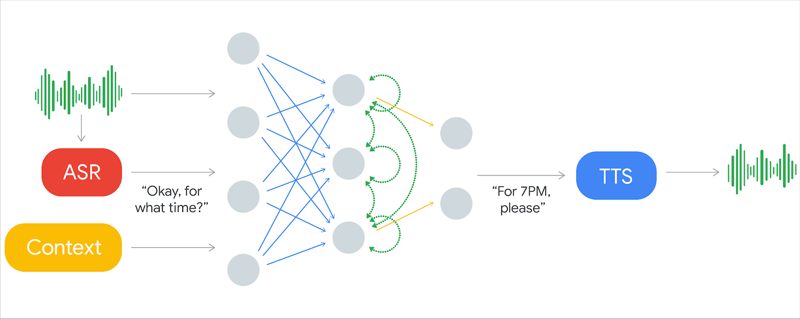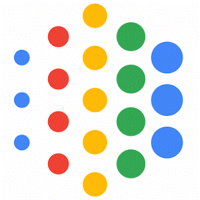| Google AI At I/O |
| Written by Sue Gee | |||
| Wednesday, 09 May 2018 | |||
|
Google Research has the new name, Google AI, plus a brand new website and at Google I/O it revealed recent advances on multiple fronts, including Google Assistant making a phone call to make a restaurant reservation using Google Duplex.
Sundar Pichai's overview of Google I/O 2018 has the title Solving problems with AI for everyone and in it he refers to Google's core mission with: The need for useful and accessible information is as urgent today as it was when Google was founded nearly two decades ago. What’s changed is our ability to organize information and solve complex, real-world problems thanks to advances in AI. The first real world problems Pichai chose as examples of the: huge opportunity for AI to transform many fields were in healthcare. He referred to past achievements of a neural net that could detect signs of diabetic retinopathy using medical images of the eye and a deep learning model that could use those same images to predict a patient’s risk of a heart attack or stroke with a surprisingly high degree of accuracy. Bringing us up to date he reported on AI models are able to predict medical events, such as hospital re-admissions and length of stays, by analyzing the pieces of information embedded in de-identified health records saying: These are powerful tools in a doctor’s hands and could have a profound impact on health outcomes for patients. We’re going to be publishing a paper on this research today and are working with hospitals and medical institutions to see how to use these insights in practice. Turning to a real problem in the realm of accessibility - that of trying to follow a conversation on TV where people are speaking over one another - Pichai introduced Looking to Listen - an AI technology that uses audio and visual cues together to isolate speakers and caption each one separately. AI is being applied to Gmail with a Smart Compose feature in which, by understanding the context of an email, phrases are suggested to help you write an email quickly and efficiently. More AI is bringing improvements to Google Maps - which now provides information about the businesses you are looking for including opening hours and parking availability; Google Lens, which is being incorporated into a range of cameras and lets you point at a target - be it a building, a concert poster or an object in a shop window display to get information about it; and Google News which has been revamped to use artificial intelligence: The reimagined Google News uses a new set of AI techniques to take a constant flow of information as it hits the web, analyze it in real time and organize it into storylines. This approach means Google News understands the people, places and things involved in a story as it evolves, and connects how they relate to one another. At its core, this technology lets us synthesize information and put it together in a way that helps you make sense of what’s happening, and what the impact or reaction has been. It is ithe AI advances in Google Assistant that seem the most exciting, but a quick detour into other improvements in Google Assistant that don't need much, or any, intelligence:
The Google Assistant can already order you a coffee or buy movie tickets online but the technology advance for Google Assistant, Google Duplex, means that in future it can make phone calls on your behalf as demoed in this clip where it's Google Assistant that is making the booking:
According to a post on the Google AI blog by Yaniv Leviathan, Google Duplex lead and Yossi Matias, Vice President, Engineering, Google, Duplex is: Google Duplex, a new technology for conducting natural conversations to carry out “real world” tasks over the phone. The technology is directed towards completing specific tasks, such as scheduling certain types of appointments. For such tasks, the system makes the conversational experience as natural as possible, allowing people to speak normally, like they would to another person, without having to adapt to a machine. They add: One of the key research insights was to constrain Duplex to closed domains, which are narrow enough to explore extensively. Duplex can only carry out natural conversations after being deeply trained in such domains. It cannot carry out general conversations. Their post also explains that Duplex is a recurrent neural network built using TensorFlow Extended: To obtain its high precision, we trained Duplex’s RNN on a corpus of anonymized phone conversation data. The network uses the output of Google’s automatic speech recognition (ASR) technology, as well as features from the audio, the history of the conversation, the parameters of the conversation (e.g. the desired service for an appointment, or the current time of day) and more. We trained our understanding model separately for each task, but leveraged the shared corpus across tasks. Finally, we used hyperparameter optimization from TFX to further improve the model.
As well as the speech recognition and text-to-speech capabilities that have been refined over several years, this technology copes with the fact that the same sentence can have very different meanings depending on context. For example, when booking reservations “OK for 4” can mean the time of the reservation or the number of people and often the relevant context might be several sentences back, a problem that gets compounded by the increased word error rate in phone calls. So in future, in place of making their own phone calls, users will simply interacts with the Google Assistant. This will have the benefit that: Duplex enables delegated communication with service providers in an asynchronous way, e.g., requesting reservations during off-hours, or with limited connectivity. It can also help address accessibility and language barriers, e.g., allowing hearing-impaired users, or users who don’t speak the local language, to carry out tasks over the phone. Google AI intends to start testing Duplex technology within the Google Assistant this summer to help users do a limited range of tasks including making restaurant reservations, scheduling hair salon appointments, and confirming opening hours over the phone.
More InformationSolving problems with AI for everyone Deep Learning For Electronic Health The new Google News: AI meets human intelligence Google Duplex: An AI System for Accomplishing Real World Tasks Over the Phone Related ArticlesThe Chatbot Phenomenon - An Infographic
To be informed about new articles on I Programmer, sign up for our weekly newsletter, subscribe to the RSS feed and follow us on Twitter, Facebook or Linkedin.
Comments
or email your comment to: comments@i-programmer.info |
|||
| Last Updated ( Thursday, 26 July 2018 ) |





